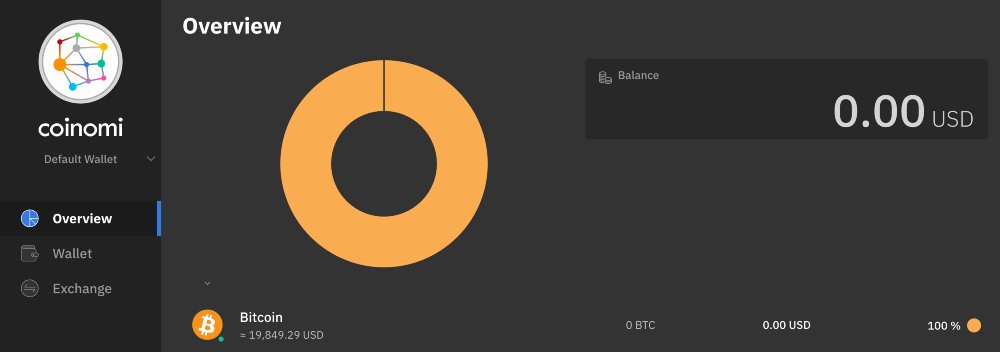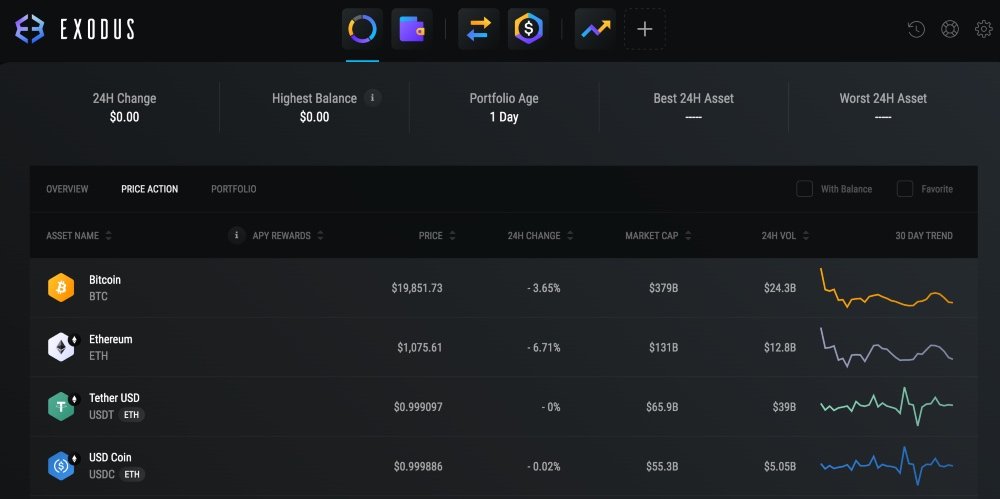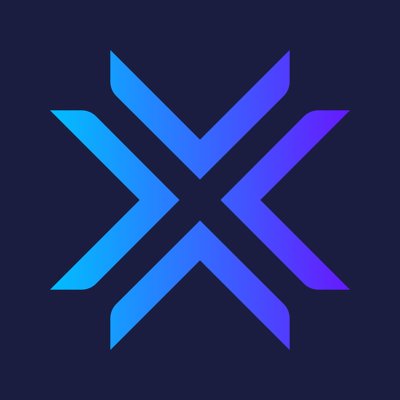Comparer Coinomi vs Exodus Wallet
Coinomi and Exodus have been present on the top wallets lists for years. These brands are well-known and recommended for beginners; these wallets are multi-functional and easy to use. This article reviews the main features and characteristics of these wallets. The main differences and similarities are shown in the table. Read through to see if these wallets meet your needs and which of them is better for you.
What Is Coinomi?
Coinomi is the oldest multi-chain wallet among industry leaders. It was created in 2014. The company headquarters is in the British Virgin Islands. The CEO is American entrepreneur George Kimionis. The wallet quickly gained popularity. As of 2022, it supports over 1,700 cryptocurrencies based on 125 blockchains. You will have a hard time finding a non-custodian wallet supporting more altcoins. On top of digital assets, Coinomi is capable of operating transactions with 168 fiat currencies. Also, Coinomi supports Seg-Wit.

Thanks to the integration with ShapeShift and Changelly, Coinomi users can effortlessly exchange altcoins within the wallet interface. Another partner providing the service to Coinomi users is Binance DEX. All these partnerships make Coinomi a handy tool not only for storage but also for exchanging money depending on what coin you need at the particular moment. One of the top priorities of Coinomi is the security of assets. The staking platform and dApp browser are also in place. Another vital feature of Coinomi is that it doesn't take commissions on top of miner fees.
What Is Exodus?
Exodus is a multi-currency non-custodial crypto wallet targeted at the newbies audience. The wallet is user-friendly and has an attractive and fun design. It was aimed to make people more confident in their first contact with cryptocurrencies. Exodus was founded in 2015 by JP Richardson and Daniel Castagnoli.

The wallet supports over 200 cryptocurrencies. It can be integrated with hardware wallets (Trezor) for better security. Exodus allows buying digital money with USD, EUR, and GBP. The wallet supports numerous payment methods, including ApplePay, bank card, and wire transfers. The wallet can be used for a token swap via the integrated ShapeShift service. Another important partnership is Changelly, which allows users to exchange cryptocurrencies easily.
As for commissions, Exodus doesn't charge anything on top of miners' fees. However, Exodus sets high miner fees to prioritize transactions of its users. The wallet is backed up with a 12-word seed phrase. Also, Exodus is characterized by a focus on anonymity as Exodus doesn't require personal data when you set the wallet. Considering that the wallet is non-custodial, the main threat comes from phishing attacks and weak passwords.
Coinomi vs. Exodus (table)
| Factor | Coinomi | Exodus |
| Platforms | iOS, Android, MacOS, Linux, Windows | iOS, Android, MacOS, Linux, Windows, browser |
|
Types of transactions |
send, recieve, store, exchange, swap, stake | send, recieve, store, exchange, swap |
| Transaction fees | miner fees | miner fees |
| Supported currencies | 1,770+ | 215+ |
| Security features | seed phrase, your data doesn't leave your device | seed phrase, your data doesn't leave your device |
| Payment methods | Simplex, bank card, wire transfer, etc | Apple Pay, bank card, wire transfer |
| Custodial? | no | no |
| Extra features | Cold staking, swaps via ShapeShift, exchange via Changelly, DeFi ready wallet | FTX exchange, swaps via ShapeShift, exchange via Changelly |
| Access | global | global |
Coinomi vs. Exodus (details)
Platforms
Both wallets have desktop and mobile versions (iOS- and Android-based). Exodus added mobile versions not long ago but what really matters is that now both wallets can be used on any device. What's more important is that Exodus can be installed as a browser extension.
Types of transactions
Both wallets are packed with features. Therefore they allow many types of transactions. However, staking available for Coinomi users is not supported by Exodus.
Transaction fees
Both wallets charge only miner fees. The only difference is that Exodus doesn't allow you to regulate the size of commissions, and you won't be able to minimize transaction fees if you use this wallet.
Supported currencies
You won't find a more versatile wallet regarding the number of supported currencies than Coinomi, among the top wallet brands. Coinomi supports eight times as many coins as Exodus. Because Coinomi also supports 168 fiat currencies, it makes the wallet much more convenient than Exodus.
Security features
Both Exodus and Coinomi are non-custodial HD wallets with solid security features. Exodus has an advantage of the Trezor wallet integrity. Hardware wallets are considered the safest, and Exodus users can secure their funds by buying and connecting a Trezor wallet. Coinomi users can't connect their accounts to hardware wallets.
Payment methods
Thanks to the partnership with Simplex, Coinomi has a large number of supported payment methods. Exodus supports fewer options.
Extra features
Coinomi supports staking, which is not the case for Exodus users. On the other hand, Exodus has an integrated FTX exchange, a feature not available for Coinomi users. All in all, both wallets are full-packed with features.
Access
Both wallets are available worldwide and don't require much user data.
| Entreprise | ||
|---|---|---|
| User rating | 35 avis d'utilisateurs | 23 avis d'utilisateurs |
| Cryptogeek rating | ||
| Score de confiance Comment ça fonctionne |
Propos
|
Coinomi est l'un des plus anciens portefeuilles de crypto-monnaie, prenant en charge un large éventail de devises et de jetons depuis le lancement du projet. Actuellement, le nombre de pièces et de jetons pris en charge dépasse cinq cents. Le portefeuille fournit un échange intégré en tant que fonctionnalité supplémentaire. Les versions bureau et mobile du portefeuille sont disponibles.
|
Exodus est un portefeuille multi-crypto-monnaie de premier plan offrant de nombreuses possibilités de personnalisation et de nombreuses fonctionnalités disponibles. Il a été fondé en 2016 avec l'idée de fournir aux débutants en cryptographie un outil pratique pour gérer leurs pièces. Il n'y a pas de frais d'inscription ou de maintenance facturés pour son utilisation.
|
Date de fondation
| 2014 | 2016 |
Pays
| International | USA |
Langues
| English, German, French, Spanish, Russian, Chinese | English |
Type de portefeuille
| Software wallet | Software wallet |
Type de stockage
| Cold wallet | Hot wallet |
Clés privées
| Disponible | Disponible |
Pièces disponibles
| 67 - Bitcoin (BTC), IOTA (MIOTA), Tezos (XTZ), Ethereum Classic (ETC), Verge (XVG), Bitcoin Gold (BTG), Zcash (ZEC), Dogecoin (DOGE), Decred (DCR), 0x (ZRX), Loopring (LRC), Komodo (KMD), Aion (AION), DigiByte (DGB), aelf (ELF), PIVX (PIVX), MonaCoin (MONA), Syscoin (SYS), ReddCoin (RDD), Power Ledger (POWR), Zcoin (XZC), Dentacoin (DCN), Horizen (ZEN), Iconomi (ICN), SmartCash (SMART), POA Network (POA), Nexus (NXS), Achain (ACT), GameCredits (GAME), Dent (DENT), Vertcoin (VTC), Time New Bank (TNB), Enjin Coin (ENJ), NavCoin (NAV), Ripio Credit Network (RCN), Einsteinium (EMC2), Groestlcoin (GRS), Peercoin (PPC), USD Coin (USDC), Ripple (XRP), Binance Coin (BNB), Bitcoin Cash (BCH), Bitcoin SV (BSV), Cardano (ADA), Dash (DASH), Ethereum (ETH), Litecoin (LTC), Monero (XMR), NEM (XEM), Tether (USDT), Tron (TRX), BitTorrent (BTT), NXM (NXM), Ampleforth (AMPL), xDai (STAKE), Nectar (NEC), sUSD (SUSD), Huobi Token (HT), Binance USD (BUSD), Celsius (CEL), Algorand (ALGO), OKB (OKB), TrueUSD (TUSD), HUSD (HUSD), Paxos Standard (PAX), Quant (QNT), DxChain Token (DX) | 90 - Bitcoin (BTC), Basic Attention Token (BAT), IOTA (MIOTA), Tezos (XTZ), Ethereum Classic (ETC), NEO (NEO), VeChain (VET), OmiseGO (OMG), Qtum (QTUM), Lisk (LSK), ICON (ICX), Ontology (ONT), Bitcoin Gold (BTG), Zcash (ZEC), Nano (NANO), Populous (PPT), Dogecoin (DOGE), DigixDAO (DGD), Waves (WAVES), Zilliqa (ZIL), Decred (DCR), Status (SNT), 0x (ZRX), Golem (GNT), DigiByte (DGB), Ark (ARK), Dragonchain (DRGN), QASH (QASH), Veritaseum (VERI), Gas (GAS), Voyager Token (VGX), FunFair (FUN), Revain (REV), SALT (SALT), Power Ledger (POWR), Zcoin (XZC), Storm (STORM), Storj (STORJ), TenX (PAY), Neblio (NEBL), Cindicator (CND), Dentacoin (DCN), Civic (CVC), Dent (DENT), Quantstamp (QSP), Gnosis (GNO), iExec RLC (RLC), Decentraland (MANA), Polymath (POLY), Po.et (POE), Loom Network (LOOM), Time New Bank (TNB), Aragon (ANT), Raiden Network Token (RDN), Metal (MTL), Santiment Network Token (SAN), Genesis Vision (GVT), Pillar (PLR), AirSwap (AST), Ripio Credit Network (RCN), Streamr DATAcoin (DATA), SingularDTV (SNGLS), Ambrosus (AMB), Edgeless (EDG), MediShares (MDS), AppCoins (APPC), USD Coin (USDC), Ripple (XRP), Binance Coin (BNB), Bitcoin Cash (BCH), Bitcoin SV (BSV), Cardano (ADA), Cosmos (ATOM), Dash (DASH), EOS (EOS), Ethereum (ETH), Litecoin (LTC), Monero (XMR), NEM (XEM), Stellar (XLM), Tether (USDT), Tron (TRX), Polkadot (DOT), BitTorrent (BTT), Compound Dai (CDAI), Crypto.com Coin (CRO), Algorand (ALGO), TrueUSD (TUSD), Hedera Hashgraph (HBAR), Solana (SOL) |
Sécurité
| Personal | Personal |
Anonymat
| Medium | High |
Facilité d'utilisation
| Easy | Easy |
A une carte jointe
| no | no |
Dispose d'installations commerciales
| Pas de données | yes |
A des bons et des offres
| Pas de données | Pas de données |
Caractéristiques
| Hierarchical Deterministic, Multi-Signature, Open Source, Biometric Authentication | Hierarchical Deterministic |
| Propos |
Coinomi est l'un des plus anciens portefeuilles de crypto-monnaie, prenant en charge un large éventail de devises et de jetons depuis le lancement du projet. Actuellement, le nombre de pièces et de jetons pris en charge dépasse cinq cents. Le portefeuille fournit un échange intégré en tant que fonctionnalité supplémentaire. Les versions bureau et mobile du portefeuille sont disponibles.
|
Exodus est un portefeuille multi-crypto-monnaie de premier plan offrant de nombreuses possibilités de personnalisation et de nombreuses fonctionnalités disponibles. Il a été fondé en 2016 avec l'idée de fournir aux débutants en cryptographie un outil pratique pour gérer leurs pièces. Il n'y a pas de frais d'inscription ou de maintenance facturés pour son utilisation.
|
|---|---|---|
| Date de fondation | Date de fondation 2014 | Date de fondation 2016 |
| Pays | Pays International | Pays USA |
| Langues | Langues English, German, French, Spanish, Russian, Chinese | Langues English |
| Type de portefeuille | Type de portefeuille Software wallet | Type de portefeuille Software wallet |
| Type de stockage | Type de stockage Cold wallet | Type de stockage Hot wallet |
| Clés privées | Clés privées Disponible | Clés privées Disponible |
| Pièces disponibles | Pièces disponibles 67 - Bitcoin (BTC), IOTA (MIOTA), Tezos (XTZ), Ethereum Classic (ETC), Verge (XVG), Bitcoin Gold (BTG), Zcash (ZEC), Dogecoin (DOGE), Decred (DCR), 0x (ZRX), Loopring (LRC), Komodo (KMD), Aion (AION), DigiByte (DGB), aelf (ELF), PIVX (PIVX), MonaCoin (MONA), Syscoin (SYS), ReddCoin (RDD), Power Ledger (POWR), Zcoin (XZC), Dentacoin (DCN), Horizen (ZEN), Iconomi (ICN), SmartCash (SMART), POA Network (POA), Nexus (NXS), Achain (ACT), GameCredits (GAME), Dent (DENT), Vertcoin (VTC), Time New Bank (TNB), Enjin Coin (ENJ), NavCoin (NAV), Ripio Credit Network (RCN), Einsteinium (EMC2), Groestlcoin (GRS), Peercoin (PPC), USD Coin (USDC), Ripple (XRP), Binance Coin (BNB), Bitcoin Cash (BCH), Bitcoin SV (BSV), Cardano (ADA), Dash (DASH), Ethereum (ETH), Litecoin (LTC), Monero (XMR), NEM (XEM), Tether (USDT), Tron (TRX), BitTorrent (BTT), NXM (NXM), Ampleforth (AMPL), xDai (STAKE), Nectar (NEC), sUSD (SUSD), Huobi Token (HT), Binance USD (BUSD), Celsius (CEL), Algorand (ALGO), OKB (OKB), TrueUSD (TUSD), HUSD (HUSD), Paxos Standard (PAX), Quant (QNT), DxChain Token (DX) | Pièces disponibles 90 - Bitcoin (BTC), Basic Attention Token (BAT), IOTA (MIOTA), Tezos (XTZ), Ethereum Classic (ETC), NEO (NEO), VeChain (VET), OmiseGO (OMG), Qtum (QTUM), Lisk (LSK), ICON (ICX), Ontology (ONT), Bitcoin Gold (BTG), Zcash (ZEC), Nano (NANO), Populous (PPT), Dogecoin (DOGE), DigixDAO (DGD), Waves (WAVES), Zilliqa (ZIL), Decred (DCR), Status (SNT), 0x (ZRX), Golem (GNT), DigiByte (DGB), Ark (ARK), Dragonchain (DRGN), QASH (QASH), Veritaseum (VERI), Gas (GAS), Voyager Token (VGX), FunFair (FUN), Revain (REV), SALT (SALT), Power Ledger (POWR), Zcoin (XZC), Storm (STORM), Storj (STORJ), TenX (PAY), Neblio (NEBL), Cindicator (CND), Dentacoin (DCN), Civic (CVC), Dent (DENT), Quantstamp (QSP), Gnosis (GNO), iExec RLC (RLC), Decentraland (MANA), Polymath (POLY), Po.et (POE), Loom Network (LOOM), Time New Bank (TNB), Aragon (ANT), Raiden Network Token (RDN), Metal (MTL), Santiment Network Token (SAN), Genesis Vision (GVT), Pillar (PLR), AirSwap (AST), Ripio Credit Network (RCN), Streamr DATAcoin (DATA), SingularDTV (SNGLS), Ambrosus (AMB), Edgeless (EDG), MediShares (MDS), AppCoins (APPC), USD Coin (USDC), Ripple (XRP), Binance Coin (BNB), Bitcoin Cash (BCH), Bitcoin SV (BSV), Cardano (ADA), Cosmos (ATOM), Dash (DASH), EOS (EOS), Ethereum (ETH), Litecoin (LTC), Monero (XMR), NEM (XEM), Stellar (XLM), Tether (USDT), Tron (TRX), Polkadot (DOT), BitTorrent (BTT), Compound Dai (CDAI), Crypto.com Coin (CRO), Algorand (ALGO), TrueUSD (TUSD), Hedera Hashgraph (HBAR), Solana (SOL) |
| Sécurité | Sécurité Personal | Sécurité Personal |
| Anonymat | Anonymat Medium | Anonymat High |
| Facilité d'utilisation | Facilité d'utilisation Easy | Facilité d'utilisation Easy |
| A une carte jointe | A une carte jointe no | A une carte jointe no |
| Dispose d'installations commerciales | Dispose d'installations commerciales Pas de données | Dispose d'installations commerciales yes |
| A des bons et des offres | A des bons et des offres Pas de données | A des bons et des offres Pas de données |
| Caractéristiques | Caractéristiques Hierarchical Deterministic, Multi-Signature, Open Source, Biometric Authentication | Caractéristiques Hierarchical Deterministic |
Social
Site Internet
| www.coinomi.com | www.exodus.io |
| Coinomiwallet | Exodus_io |
| Site Internet | Site Internet www.coinomi.com | Site Internet www.exodus.io |
|---|---|---|
| Twitter Coinomiwallet | Twitter Exodus_io |
Avantages
| - Clés privées stockées sur les appareils mobiles des utilisateurs - Intégration avec les échanges ShapeShift et Changelly pour le trading crypto - Ne charge pas de frais - Le Soutien de 24/7 | - Accès aux clés privées - La possibilité de récupérer des clés privées, en utilisant la phrase de départ - Grande variété de devises - Échange facile (conversion crypto-crypto) - Assistance rapide et guide d'aide complet |
Désavantages
| - Le support technique ne résout pas les problèmes rapidement - Aucune version mise à jour de l'open source. | - Absence de fonctionnalités de sécurité majeures - Frais relativement élevés |
Évaluation
| User rating | User rating 35 avis d'utilisateurs | User rating 23 avis d'utilisateurs |
|---|---|---|
| Cryptogeek rating | Cryptogeek rating | Cryptogeek rating |
| Avantages | Avantages - Clés privées stockées sur les appareils mobiles des utilisateurs - Intégration avec les échanges ShapeShift et Changelly pour le trading crypto - Ne charge pas de frais - Le Soutien de 24/7 | Avantages - Accès aux clés privées - La possibilité de récupérer des clés privées, en utilisant la phrase de départ - Grande variété de devises - Échange facile (conversion crypto-crypto) - Assistance rapide et guide d'aide complet |
| Désavantages | Désavantages - Le support technique ne résout pas les problèmes rapidement - Aucune version mise à jour de l'open source. | Désavantages - Absence de fonctionnalités de sécurité majeures - Frais relativement élevés |
L'évaluation des utilisateurs Coinomi est 3.7, basée sur 35 avis des utilisateurs. L'évaluation des utilisateurs de Exodus est 4, basée sur 23 avis d'utilisateurs.
We also calculate the special Cryptogeek TrustScore based on the characteristics of each wallet.
| Nous choisissons le gagnant en fonction de notre cote decore. N'oubliez pas, c'est à vous de choisir quelle entreprise choisir! Comment calculons-nous le Score de confiance? |
It's safe to say that by most parameters, Coinomi beats Exodus. The latter may be considered more attractive and convenient in design, but we can't know that this difference is crucial. If you want a multi-currency wallet supporting FTX exchange, then Exodus, not Coinomi, will be the choice. Exodus will be the choice if you wish to use a software wallet to integrate it with a Trezor wallet. In all other cases, Coinomi seems to be a better option than Exodus.
Coinomi and Exodus have been present on the top wallets lists for years. These brands are well-known and recommended for beginners; these wallets are multi-functional and easy to use. This article reviews the main features and characteristics of these wallets. The main differences and similarities are shown in the table. Read through to see if these wallets meet your needs and which of them is better for you.
What Is Coinomi?
Coinomi is the oldest multi-chain wallet among industry leaders. It was created in 2014. The company headquarters is in the British Virgin Islands. The CEO is American entrepreneur George Kimionis. The wallet quickly gained popularity. As of 2022, it supports over 1,700 cryptocurrencies based on 125 blockchains. You will have a hard time finding a non-custodian wallet supporting more altcoins. On top of digital assets, Coinomi is capable of operating transactions with 168 fiat currencies. Also, Coinomi supports Seg-Wit.

Thanks to the integration with ShapeShift and Changelly, Coinomi users can effortlessly exchange altcoins within the wallet interface. Another partner providing the service to Coinomi users is Binance DEX. All these partnerships make Coinomi a handy tool not only for storage but also for exchanging money depending on what coin you need at the particular moment. One of the top priorities of Coinomi is the security of assets. The staking platform and dApp browser are also in place. Another vital feature of Coinomi is that it doesn't take commissions on top of miner fees.
What Is Exodus?
Exodus is a multi-currency non-custodial crypto wallet targeted at the newbies audience. The wallet is user-friendly and has an attractive and fun design. It was aimed to make people more confident in their first contact with cryptocurrencies. Exodus was founded in 2015 by JP Richardson and Daniel Castagnoli.

The wallet supports over 200 cryptocurrencies. It can be integrated with hardware wallets (Trezor) for better security. Exodus allows buying digital money with USD, EUR, and GBP. The wallet supports numerous payment methods, including ApplePay, bank card, and wire transfers. The wallet can be used for a token swap via the integrated ShapeShift service. Another important partnership is Changelly, which allows users to exchange cryptocurrencies easily.
As for commissions, Exodus doesn't charge anything on top of miners' fees. However, Exodus sets high miner fees to prioritize transactions of its users. The wallet is backed up with a 12-word seed phrase. Also, Exodus is characterized by a focus on anonymity as Exodus doesn't require personal data when you set the wallet. Considering that the wallet is non-custodial, the main threat comes from phishing attacks and weak passwords.
Coinomi vs. Exodus (table)
| Factor | Coinomi | Exodus |
| Platforms | iOS, Android, MacOS, Linux, Windows | iOS, Android, MacOS, Linux, Windows, browser |
|
Types of transactions |
send, recieve, store, exchange, swap, stake | send, recieve, store, exchange, swap |
| Transaction fees | miner fees | miner fees |
| Supported currencies | 1,770+ | 215+ |
| Security features | seed phrase, your data doesn't leave your device | seed phrase, your data doesn't leave your device |
| Payment methods | Simplex, bank card, wire transfer, etc | Apple Pay, bank card, wire transfer |
| Custodial? | no | no |
| Extra features | Cold staking, swaps via ShapeShift, exchange via Changelly, DeFi ready wallet | FTX exchange, swaps via ShapeShift, exchange via Changelly |
| Access | global | global |
Coinomi vs. Exodus (details)
Platforms
Both wallets have desktop and mobile versions (iOS- and Android-based). Exodus added mobile versions not long ago but what really matters is that now both wallets can be used on any device. What's more important is that Exodus can be installed as a browser extension.
Types of transactions
Both wallets are packed with features. Therefore they allow many types of transactions. However, staking available for Coinomi users is not supported by Exodus.
Transaction fees
Both wallets charge only miner fees. The only difference is that Exodus doesn't allow you to regulate the size of commissions, and you won't be able to minimize transaction fees if you use this wallet.
Supported currencies
You won't find a more versatile wallet regarding the number of supported currencies than Coinomi, among the top wallet brands. Coinomi supports eight times as many coins as Exodus. Because Coinomi also supports 168 fiat currencies, it makes the wallet much more convenient than Exodus.
Security features
Both Exodus and Coinomi are non-custodial HD wallets with solid security features. Exodus has an advantage of the Trezor wallet integrity. Hardware wallets are considered the safest, and Exodus users can secure their funds by buying and connecting a Trezor wallet. Coinomi users can't connect their accounts to hardware wallets.
Payment methods
Thanks to the partnership with Simplex, Coinomi has a large number of supported payment methods. Exodus supports fewer options.
Extra features
Coinomi supports staking, which is not the case for Exodus users. On the other hand, Exodus has an integrated FTX exchange, a feature not available for Coinomi users. All in all, both wallets are full-packed with features.
Access
Both wallets are available worldwide and don't require much user data.

